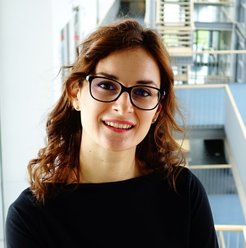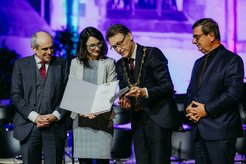Francesca Cascella honoured best Ph.D. student of the Department of Process and Systems Engineering in 2022
Research on chiral molecules at the solid state and the design of crystallisation processes
Dr. Francesca Cascella has been selected as the best Ph.D. student in the period 2021-2022 within the Faculty of Process and Systems Engineering at the Otto von Guericke University Magdeburg for her thesis on “Resolution of enantiomers of chiral compounds using crystallization processes: from fundamental studies to process development". She received the award during the annual Academic Ceremony held by the university on 29 November 2022 in the Johanniskirche of Magdeburg city.

Francesca Cascellas research was focused on the experimental determination of fundamental properties of chiral molecules at the solid-state and the design of crystallisation processes to isolate their enantiomers. Chirality is an important concept in life science. Small chiral molecules such as amino acids and sugars are the building blocks of biomolecules of living systems and therefore, many properties related to the interaction of drugs, agrochemicals as well as natural chiral compounds with the biological environment exhibit a marked enantioselectivity. Due to the potential different pharmacokinetics, side effects, toxicology and pharmacodynamics of enantiomers of medicinal chiral molecules, chiral drugs are almost exclusively marketed and applied as single enantiomers. The thesis of Francesca Cascella provides a comprehensive experimental study on the applicability of crystallization processes for the production of pure enantiomers of pharmaceutically relevant compounds.
Relevant for application in pharmaceutical industry
Three chiral model compounds which find application in the pharmaceutical industry were objects of her investigation. The study included the experimental determination of the solid-liquid equilibria of the studied systems, such as binary melt phase diagrams and ternary solubility phase diagrams, along with investigations on the solid-state properties of the model compounds as well as the design and evaluation of the crystallization processes.
The results have demonstrated how the thermodynamic and kinetic properties of the substances have profound implications on the performances of the resolution runs. Together with the feasibility study of crystallization-based resolution techniques the thesis has addressed one of the decisive aspects for the process development, i.e. the performance assessment of the crystallization processes, by determining chosen key performance indicators of the resolution runs such as purity, productivity, and yield.
Overall, the thesis of Francesca Cascella provided important tools to efficiently apply resolution techniques based on the preferential crystallization principle on two substances that are relevant for the pharmaceutical industry. Advantages and limits of the single batch and the coupled crystallizer configuration have been demonstrated for the two studied systems, through evaluation of chosen key performance indicators of the processes. The applicability of the fluidized bed crystallizer in continuous operation mode has been studied for the API guaifenesin, hence paving the way to further development of this promising method for the resolution of the enantiomers of other chiral systems.
About Francesca Cascella
Francesca Cascella joined the research group Physical and Chemical Foundations of Process Engineering at the Max Planck Institute Magdeburg in May 2017 as an Early Stage Researcher within the Marie Curie Project CORE-ITN under the supervision of apl. Prof. Dr. Heike Lorenz and Prof. Andreas Seidel-Morgenstern. She received her Master’s degree in Chemistry from the University of Bari (Italy). Her main research activity focused on experimentally determining fundamental properties of pharmaceutically relevant molecules as well as the operation of enantioseparation processes via preferential crystallization. Francesca Cascella successfully defended her Ph.D. thesis in October 2021 and is currently working as a Senior Scientist in the field of Crystallization at GSK in the United Kingdom.


